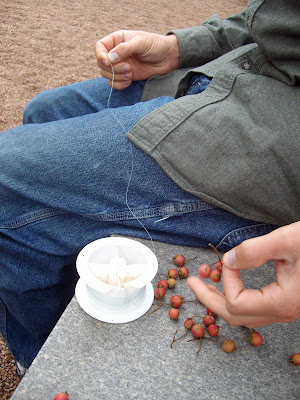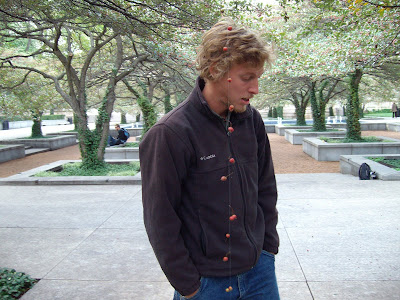I had this thought, as this web log is intended to showcase things that I make/create... What have I done in the past four years? One answer is, "Wrote papers. English papers." So here is one that I got a subjective "A" on. Enjoy.
Molly Adams
Wednesday, November 7, 2007
David Mason, The Romantic Lyric
Combating Stagnancy: Savage Torpor in “These chairs they have no words to utter”
As with any screed of idealism, William Wordsworth has trouble living up to the goals he sets for himself in the Preface he wrote for the 2nd edition of Lyrical Ballads. Trying to head off a critic from panning you usually leads to generalizations and sweeping statements made about your work. But rather than finding all the spots where he uses so-called elevated/poetic imagery that no farmer would ever use, I’d like to give him the benefit of the doubt and examine the poem where I believe he is the most successful in meeting some of his own standards. Of primary importance to this paper, Wordsworth states that, “For a multitude of causes, unknown to former times, are now acting with a combined force to blunt the discriminating powers of the mind and, unfitting it for all voluntary exertion, to reduce it to a state of almost savage torpor” (499). Ralph Waldo Emerson wrote that the opposite of truth is repose. To be reduced to a state of savage torpor is to cease to seek the truth and commit one’s self to ignorance. Wordsworth writes further that, “I am almost ashamed to have spoken of the feeble effort with which I have endeavoured to counteract it [the “deluges of idle and extravagant stories in verse.”] The time is approaching when the evil will be systematically opposed by men of greater powers and with far more distinguished success” (500) This declaration exposes the political Wordsworth of sonnets and allegory, the poet fighting against the increasingly totalitarian government that had developed in England since the American and French Revolutions with his words. He saw increasing complacency around him, people unwilling to use their minds because it might land them in jail. Although “These chairs they have no words to utter” (528-29) is not a call to arms—subtlety is key—it shares a personal story of rejection of the complacency that into which, oppression tempts the human mind.
The objects first met in the poem furnish a basic room in a house: chairs and a fireplace, a ceiling and a floor. It is a rustic setting, an almost empty room, with not even a lit fire, a simple sign of comfort. “Low and Rustic life was generally chosen” as the setting for most of his poems “because the manners of rural life germinate from those elementary feelings and are more easily comprehended and are more durable…in that condition the passions of men are incorporated with the beautiful and permanent forms of nature” (497). All alone, this speaker is content in his “chamber hushed and still.” What Wordsworth is doing is flipping a scene of domestic tranquility on its head, following his guideline that, “the feeling therein developed gives importance to the action and the situation, and not the action and situation to the feeling” (499). But he has also created a speaker who has a mind “[unfit] for all voluntary exertion]. The silence of the room is stifling, “The ceiling and floor are as mute as stone.” The feeling of entrapment is then applied to these familiar objects. The speaker is alone, but the next line catches us off guard: “Happy and alone.” Because following that, the speaker is not just happy with being alone, isolated from humans who have the power to utter, stir, or flutter, or nature, which feeds the thoughts of poets (ln 13) but equates that happiness experienced through stagnancy of mind and body with the experience of being dead, thereby desiring death over “the passion, the sorrow, and the strife” of life because it is a more simple and peaceful state. This is craziness because Wordsworth tears down what he has established as an idealist vision in poetic works. Low and rustic life—at least the indoors part of it—becomes a source of savage torpor. Wordsworth has found the weakness of his own opinion concerning rural life: “Beautiful and permanent forms of nature” are not always present. And the speaker indicates himself as sharing these tendencies toward barbaric laziness that I would imagine he usually only attributes to “the accumulation of men in cities” (499).
Supposedly composed “Half an hour afterwards,” the first line of “Part Two” flat-out rejects the complacency of the first two stanzas. The speaker says, “I have thoughts that are fed by the sun,” making it clear that the outdoors are an essential ingredient to get those brain juices to flowing. The amendment to the first section complicates who is doing the speaking in the first and second parts and opens itself up to a number of interpretations concerning who is affected by savage torpor and how to avoid becoming one of the afflicted. Assuming the speaker is the same, if this part was composed 30 minutes after the first part, it suggests that to move away from savage torpor is not all that difficult. It’s as though the state of the speaker is a form of light melancholy, like he woke up a little grumpy and then after stretching and yawning, makes a drastic turn-around to greet the day. It can then be read as part of the poet’s struggle, or even part of all worker’s struggles, that no matter how good life gets, sometimes you just do not want to get out of bed. The second part embraces “The things which I see/Are welcome to me, /Welcome every one[.]” But the second composition could be the voice of a second speaker chiming in after a little thought. In this case it serves as a caveat, a voice crying out in opposition to the boredom of the first. It is Wordsworth the poet attempting to reconnect humanity to reality. “Reflecting upon the magnitude of general evil,” Wordsworth writes in the Preface, “I should be oppressed with no dishonourable melancholy had I not the deep impression of certain inherent and indestructible qualities of the human mind” (500). Sound is reintroduced in the second part as “the quiet of death” (italics mine). The poem is not a call to arms because it does not need to be. Wordsworth believes that people are basically good, innately wanting to eliminate evil and death from the world and not take oppression lying down. The lament of “peace, peace, peace,” as the last line of the poem is for all humanity, not just for one man who “may lie in peace on his bed” in line 10 of the first part. And though I read it both ways, I think it is the reading of the second part as an example of a singular rebellion against savage torpor by a poet that has the most power.
Now, what is really one of the loveliest bits about this lyric is that Wordsworth let its sentiments spill into his life of leisure with Dorothy, emphasizing his assertion that “all good poetry is the spontaneous of powerful feelings” (498). In her April 29 journal entry, a week after the poem was written, Dorothy recalls her day by a creek with William, listening to the “voice of the air”: “William heard me breathing and rustling now and then, but we both lay still and unseen by one another. He thought that it would be as sweet thus to lie so in the grave, to hear the peaceful sounds of the earth and know that one’s dear friends were near” (587). Because at the end of “These chairs they have no words to utter,” life should “be thou ever as now, /Sweetness and breath with the quiet of death, /peace, peace, peace.” Life must commingle with death, otherwise, without being part of a binary, how would life be defined? And if pervading silence signals the death of the mind, the ability to hear and appreciate sound beyond the grave is representative of an individual whose thought never ends. Like the “Lucy” poems, to die is to be immersed in the earth, losing the self-propelled force and energy of life, but becoming part of the eternally churning energy of the earth. But to be immersed in that energy, there has to be energy to begin with. To die a death of savage torpor is in effect to commit suicide by ignorance. And we all know what happens to suicides…
All following citations in the paper are from:
Wu, Duncan. Romanticism: An Anthology, 3rd Edition. Blackwell Publishing, Malden,
MA: 2006.
Friday, October 31, 2008
Wednesday, October 22, 2008
Wednesday, October 8, 2008
Goldsworthian Public Art
Monday, October 6, 2008
Let Go of That!
I "work" at Vocalo.org. I have a couple things to say about it, but for now I offer up a link to a piece I cut together using some of my own audio and some stuff that I picked off of our library and out of our website. And perhaps from here, you will explore on your own.
Subscribe to:
Comments (Atom)




